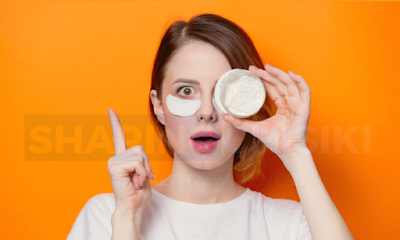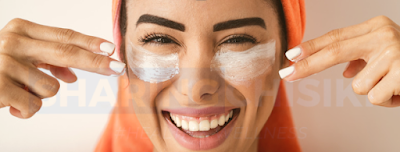Introduction to Vitamin C Eye Creams
The delicate skin around our eyes is often the first to show signs of aging, stress, and fatigue. Dark circles, fine lines, and puffiness can be persistent problems. That's where vitamin C eye creams come to the rescue! Vitamin C is a powerful antioxidant that fights free radical damage, boosts collagen production, and brightens the under-eye area. Using a targeted vitamin C eye cream consistently can lead to a more youthful, refreshed, and radiant eye area.
Understanding the Importance of Eye Care
While the benefits of vitamin C specifically for the eye area are significant, it's essential to remember that good eye creams are just one part of an overall eye care routine. Your eyes are precious and complex organs that allow you to experience the world visually. Regular eye exams with an optometrist ensure good eye health and can even uncover hidden systemic health issues like diabetes or high blood pressure. Along with professional care, protecting your eyes with sunglasses, taking breaks from screens, and getting enough sleep all contribute to long-term eye health and minimize premature signs of aging.
The Benefits of Vitamin C for the Skin
Vitamin C is a skincare superstar for a reason! As a potent antioxidant, it protects the skin from damaging free radicals generated by pollution and UV exposure. It also plays a crucial role in collagen synthesis, the protein that keeps skin firm and youthful. But the benefits for the delicate eye area are especially powerful: vitamin C can brighten dark circles, fade hyperpigmentation, improve skin texture, and reduce the appearance of fine lines and wrinkles, giving you a smoother, plumper under-eye appearance.
Why Vitamin C Eye Creams Stand Out
While vitamin C is fantastic for your entire face, there are strong reasons why it’s especially beneficial when used in dedicated eye creams. The under-eye skin is thinner and more prone to showing signs of aging and stress. Vitamin C's brightening and collagen-boosting qualities directly address these common concerns. A concentrated vitamin C formula tailored for the eyes can target stubborn dark circles, fine lines, and puffiness better than all-over face serums. When searching for the best vitamin C eye cream, look for formulas that balance potency with ingredients that soothe and hydrate this sensitive area.
Factors to Consider When Choosing the Best Vitamin C Eye Cream
With so many vitamin C eye creams on the market, picking the right one can feel overwhelming. Here are some vital factors to consider for a smart purchase:
- Vitamin C Type: Look for L-ascorbic acid, the purest and most potent form of vitamin C, or consider gentler derivatives if you have sensitive skin.
- Concentration: A concentration between 5%-15% offers a good balance of effectiveness and tolerance for most skin types.
- Packaging: Choose a product with opaque, air-tight packaging to keep the vitamin C stable and potent.
- Other Ingredients: Opt for formulas with moisturizing ingredients like hyaluronic acid, and soothing elements like peptides, to support the overall health of the delicate under-eye skin.
Top Picks: Reviews of the Best Vitamin C Eye Creams
- Ole Henriksen Banana Bright+ Eye Crème: (Link to where it can be purchased)
- Star Features: Contains brightening Vitamin C, smooths fine lines with collagen, banana powder-inspired tint for instant radiance.
- Who It's Best For: Those looking for all-around improvement, including dullness, dark circles, and fine lines.
- Price Point: $$ (around $40 USD)
- Drunk Elephant C-Tango Multivitamin Eye Cream: (Link to where it can be purchased)
- Star Features: Potent blend of 5 forms of vitamin C, peptides for firmness, cucumber extract for soothing hydration.
- Who It's Best For: Those seeking significant anti-aging benefits, and a rich, nourishing formula.
- Price Point: $$$ (around $65 USD)
- The Inkey List Vitamin C Eye Cream: (Link to where it can be purchased)
- Star Features: Simple yet effective formula with vitamin C, brightening effect, caffeine to address puffiness.
- Who It's Best For: Budget-conscious buyers, those with moderate under-eye concerns.
- Price Point: $ (around $10 USD)
How to Incorporate Vitamin C Eye Cream into Your Skincare Routine
Getting the most out of your best vitamin C eye cream depends on proper application and layering. Generally, vitamin C eye creams should be used both morning and night after cleansing and toning, but before your moisturizer. Gently pat a small amount around the orbital bone, avoiding direct contact with your eyes. Always follow with an SPF in the morning for added protection.
Tips for Maximizing the Benefits of Vitamin C Eye Cream
While the best vitamin C eye creams work wonders, here are some extra tips to really supercharge their effectiveness:
- Consistency is key: Regular morning and evening application is the best way to see noticeable results.
- Refrigerate your eye cream: The cool temperature can enhance de-puffing effects and help soothe the delicate eye area.
- Pair with other antioxidants: Use your vitamin C eye cream alongside a vitamin E serum or moisturizer for an extra antioxidant boost.
- Don't neglect your lifestyle: Prioritize healthy sleep, hydration, and a balanced diet to help your eye cream work its best.
Remember, skincare is a journey – give your vitamin C eye cream time to reveal its full potential.
Addressing Common Concerns About Vitamin C Eye Creams
It's understandable to have questions before incorporating a new product into your skincare routine. Here are some common concerns about vitamin C eye creams and helpful insights:
- Irritation: Some people may experience slight tingling or sensitivity, especially with potent vitamin C formulas. Start gradually (every other day), choose gentler derivatives if needed, and always patch test first.
- Layered Products: While layering antioxidants is beneficial, vitamin C's effectiveness can be hampered when mixed with certain ingredients like retinol and AHAs/BHAs. If you use these ingredients, alternate their use in your routine.
- Seeing Results: Give your vitamin C eye cream at least a few weeks of consistent use for noticeable improvements. Skin cell turnover takes time!
If you're considering adding a vitamin C eye cream to your routine, it's normal to have a few questions. Here are some common concerns and FAQs to help you make informed decisions:
FAQs
Can I use vitamin C eye cream if I have sensitive skin?
Yes, but it's crucial to choose a gentler formulation. Look for derivatives like magnesium ascorbyl phosphate or sodium ascorbyl phosphate, which are still effective but less likely to cause irritation. Also, start by using it only a few times a week and gradually increase frequency.Can I layer vitamin C eye cream with other skincare products?
Yes, but avoid using certain ingredients at the same time as vitamin C. Alternating vitamin C with retinol, AHAs, and BHAs in your routine will prevent them from compromising each other's effectiveness.How long does it take to see results with vitamin C eye cream?
While you might notice initial brightening, it generally takes a few weeks of consistent use to see more significant improvements in dark circles, wrinkles, and texture. Be patient and keep with your routine for optimal benefits!Important Reminder: Always patch test a new vitamin C eye cream on a discreet area before applying it around your eyes.
Conclusion: Achieving Brighter, Youthful Eyes with Vitamin C
By incorporating the best vitamin C eye cream into your skincare routine, you're taking a powerful step towards brighter, revitalized eyes. Vitamin C's antioxidant and collagen-boosting abilities, especially when formulated for the delicate under-eye skin, provide an effective path to minimizing dark circles, fine lines, and fatigue. Remember, healthy habits and consistent use will help you unveil a radiant and refreshed eye area.
Disclaimer: The information provided in this article is for informational purposes only and is not intended as a substitute for professional medical or skincare advice. Always consult with a dermatologist or qualified healthcare provider before making any changes to your skincare routine, especially if you have sensitive skin or underlying skin conditions.
Read more: Elevate Your Health: effects of food and lifestyle on biological age










